GNAWA LIVE STREAM
(![]() )
GNAWA LIVE STREAM II
(
)
GNAWA LIVE STREAM II
(![]() )
GNAWA LIVE STREAM III (
)
GNAWA LIVE STREAM III (![]() )
GNAWA LIVE STREAM IV
(
)
GNAWA LIVE STREAM IV
(![]() )
GNAWA LIVE STREAM V (
)
GNAWA LIVE STREAM V (![]() )
GNAWA LIVE STREAM VI (
)
GNAWA LIVE STREAM VI (![]() )
GNAWA LIVE STREAM VII (
)
GNAWA LIVE STREAM VII (![]() )
GNAWA LIVE STREAM VIII
(
)
GNAWA LIVE STREAM VIII
(![]() )
)
Gnawa are considered distant cousins to
those of us from the United States.
Moroccan scholar Chouki El Hamel said so well,
"Gnawa music is analogous to the blues"
(Black Morocco: A History of Slavery, Race and Islam).
Who are Gnawa?
Many have lived in and traveled throughout Africa,
nations where Black Moroccans and Americans originate today:
Cameroon, Chad, the Gambia, Guinea (why Maallem Mahmoud Gania can also
be found as Guinea), Mali, Niger, Nigeria, Senegal, Sierra Leone.
Indigenous communities are the main ones.
Some foreigners were friends. Others were scouts for caliphates,
sultanates and trans-Saharan slave trade routes.
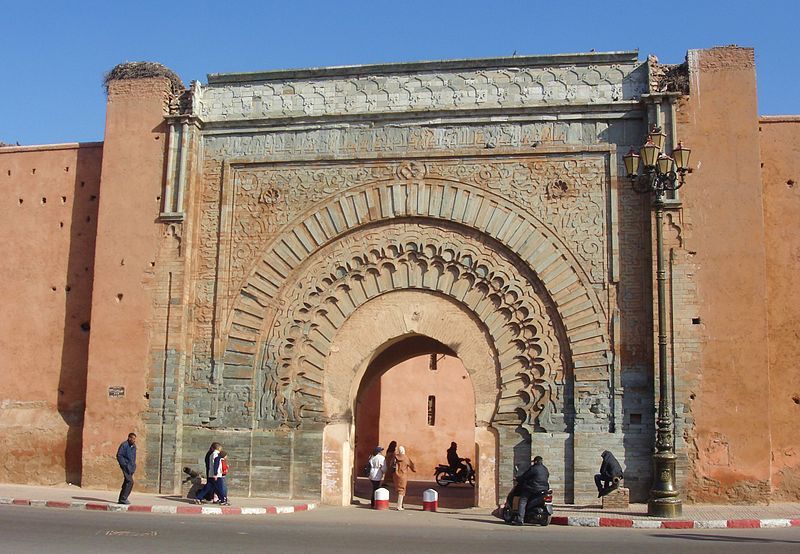
Bab Agnaou, Marrakech, leads to an Almohad Dynasty (12th century)-era casbah.
This gate shares the root word for Gnaoua,
and may derive
from the Sus Region's Tamazight word ignawen.
Bab el-Kuḥel/Kuḥl (black) was its
historical name.
Evidently Marrakech was a frequent stop for the trans-Saharan trade.
Islam may have been a common denominator between the Muslim masters
and oppressed Black African population, but the latter could still be recaptured
even after "freedom" (Black Morocco: A History of Slavery, Race and Islam).
What is Gnawa music?
Gnawa still show their Bambara, Fula, Hausa,
Wodaabe and Yoruba past proudly
in over a hundred chants and songs,
acrobatic dance during night
ceremonies, lilas! Multiple songs are named
after the communities that once
lived far from the Maghreb (Black Morocco).
They are also about various Muslim prophets,
saints and spirits like Bouderbala
(multi-colored), Chorafa (white/green) such as Lalla Fatima and Sidi
Mohammed, or Sidi Mousa (dark blue).
![]()
Download Mufaja'at
Elmoussem
This recording is by three master musicians: Mustapha
"Sam" Essghir, acclaimed Abbas Baska and Abdenbi Binizi.
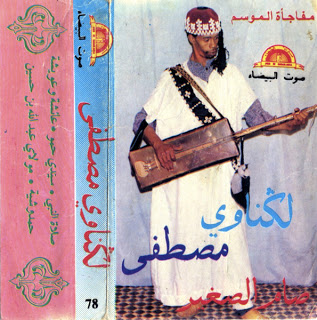
It's found on Moroccan Tape Stash's invaluable website,
dedicated to rare music and spiritually vibrant recordings.
Africans throughout their journey held onto their lives but spirits' names changed.
What are Gnawa's aspects?
An intimate relationship with ‘others’, a bridge
between worlds, is found across Africa.
Al-mlouk or jnun (pl. djinn) are invoked and respond to
offerings, tonal changes, their preferred colors.
Read more: Moroccan Gnawa and Transglobal Trance
(Pennsylvania Museum)
The multitude of songs follow changing rhythms
with castanets or karkaba, and goatskin drums
which you can call tbel or ganga.
Yoruba have gangan, similar talking drums!
It always begins with Al-Aada, a drum-heavy
composition to warm up each Gnawa troupe.
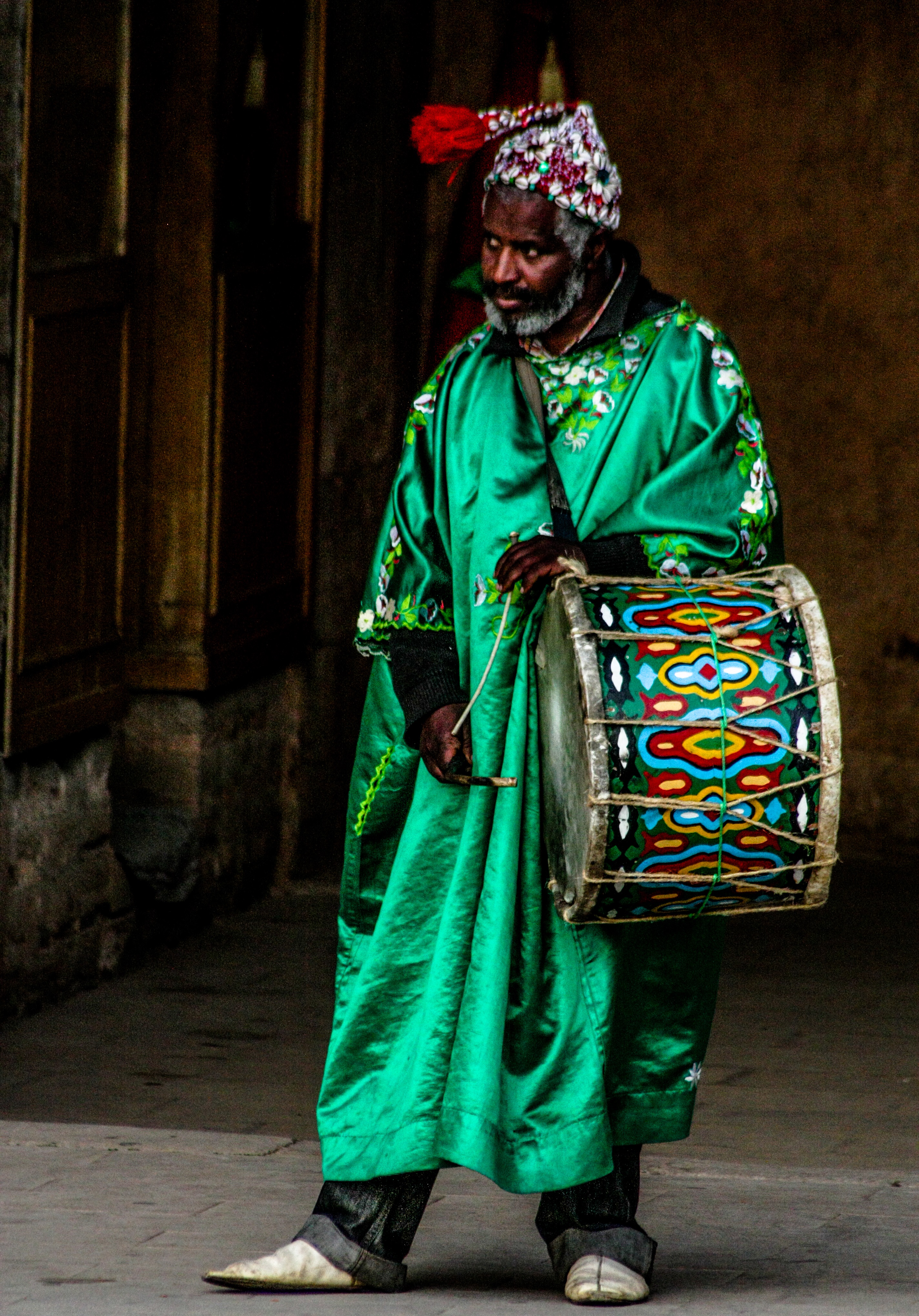
This chart explores the different scales and signatures in Gnawa songs.
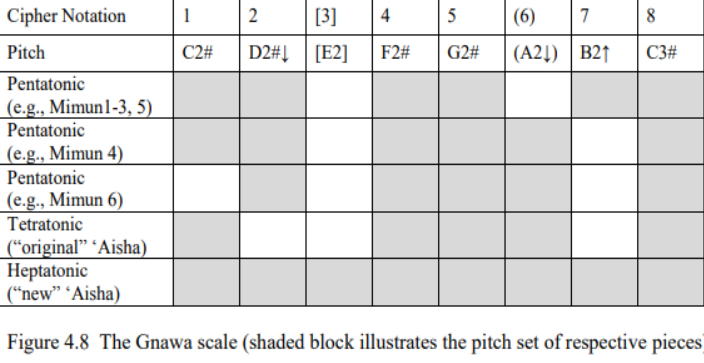
(Music
of the Gnawa of Morocco: Evolving Spaces and Times, pg. 135)
Maallems are called master musicians
because the seven spirits are
summoned through their powerful
three-stringed hajhouj lutes, no frets.
They're chosen by peers and the
mysterious other-world, not their
own vote (Radio Hchicha).
This is the centerpiece of Gnawa ceremony.
Randy Weston's interview with The Smithsonian National Museum of History is special.
"Sometimes it’s called a santir.
It’s a three-stringed instrument.
With the instrument they had contact with the creator.
They call spirits with these instruments,
they play games with these instruments,
they do things with instruments that we cannot do in the West." (Art Works)
Diasporic Parallels
If you have heard American Black spiritual songs,
Gullah ring shouts of South
Carolina, you wouldn't be surprised at the
similarity between Lowcountry residents
(southeastern U.S.) and this family gathering
in Essaouira (Gullah Homecoming).
Gullah people share ethnic ancestry from the Bambara, Fula, Mandinke.
Some could still remember basic arithmetic in
Fula dialects, long after slavery or the Passage (Yale)!
So culturally isolated, Black enclaves within oppressive systems are a global experience.
African-Americans have been accepted by our
diasporic siblings across the Atlantic Ocean.
"The same thing happened with
the Gnawa people in Morocco.
We’re like brothers and sisters but the difference is this, the
traditional music of Africa describes Africa itself."
(Art Works, cont.)
Randy Weston's cultural connections,
discoveries, still impact us today.
He chose as a 20th-century griot to honor
traditional African music at its roots,
and create with the generations who still retained older sounds (biography).
The Splendid Master Gnawa Musicians pays
homage so intimately, since
maallems passed soon after their recording, that it is hard
not to re-play 28 years later.
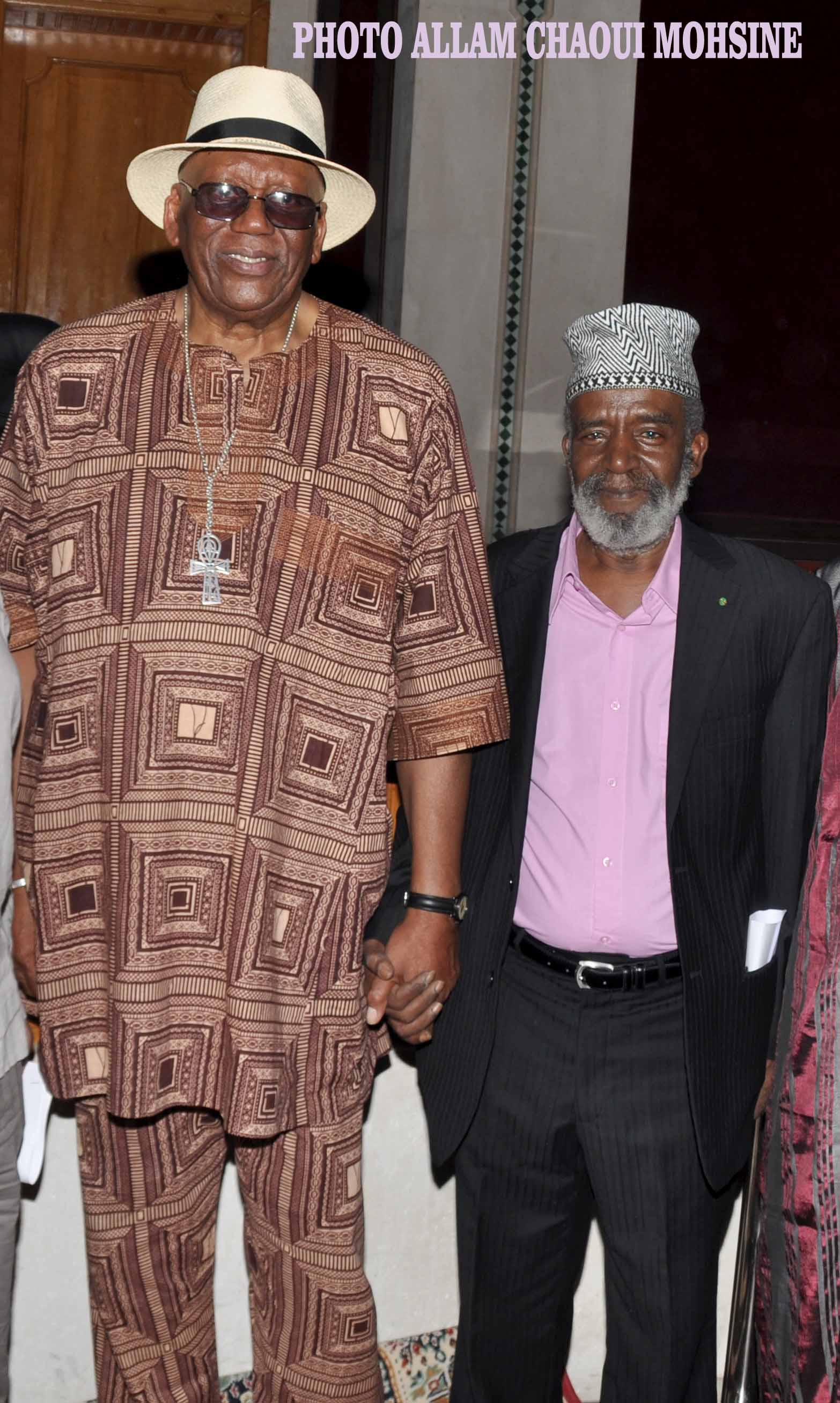
Randy Weston and Maalem Abdellah El Gourd
Activist, author and scholar Mildred Pitts Walters went to
a lila at Maalem El Gourd's Tangier home.
Weston invited her as a guest. She witnessed Gnawa
and Black America's parallels immediately.
"I recalled the ring games, and circle dances of my childhood;
the music and dance in the Pentecostal Church;
the dancing to drum beats
in Haiti, in Nigeria, in the Gambia
and Senegal, and I knew that
the mysteries of that music were
connected to what I had just
heard and seen there, in Morocco."
Other Gnawa/Gnawis, Blackness and Changing Times
Other popular Gnawis, who play traditional style,
are fellow Essaouira musicians
This is where we find another clue to Gnawa's origin story
Abderrahmane Kirouche later used the name Paco
but abd- itself is an Arabic prefix or term for 'enslaved'.
Gnawis from Maallems Abdelkebir Merchane, Abdelkader
Amlil and Abdendi el Gadari to Abdesslam Alikane and
Abderrahmane Paco likely don't keep their names as revolutionary.
This is simply who they are or were!
But the discomforting reminder,
such a lasting sentiment,
factors into why Gnawa heritage matters.
Times have changed, and women are no longer discouraged.
Check out the third Gnawa session:
Maalmas, Moqademmas and Gnawiyas.
Asmaa Hamzaoui is a Moroccan maallemah
with incredible talent. Her father,
the esteemed Rachid Hamzaoui, taught Asmaa everything he knew (The National).
"He was not concerned too much
that we were women.
He took great pride and joy in seeing us excel in Gnawa."
She has formed a great collective
with Bnat Timbouktou.
Algerian maallemah Hasna el Becharia
did not have easy acceptance (RFI),
but her resilient fire shines brightly in music and a long line of masters.
Gnawa, the Afro-Diaspora and Ancestral Memories in Sound
Gnawa is a diary of double consciousness: bonds to Lalla
Mimouna, Lalla Aicha in Saharan desert, and Moses in Egypt.
Innov Gnawa's Samir LanGus describes
this essential genre similarly.
"With the actual state of things in this world today,
we feel that traditional
music like Gnawa is essential and vital for the health and well-being
of such a rapidly changing world."
Gnaoua Culture Gnawa (UMD Music & Anthropology) Morocco's Saints & Spirits: Gnawa & The Black Diaspora Tumblr TOP OF PAGE